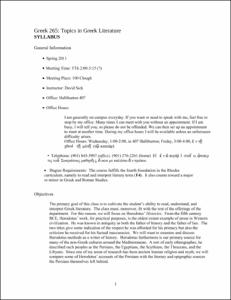Please use this identifier to cite or link to this item:
http://hdl.handle.net/10267/15117Full metadata record
| DC Field | Value | Language |
|---|---|---|
| dc.contributor.author | Sick, David | - |
| dc.date.accessioned | 2013-01-25T17:28:57Z | - |
| dc.date.available | 2013-01-25T17:28:57Z | - |
| dc.date.issued | 2011-01-12 | - |
| dc.identifier.uri | http://hdl.handle.net/10267/15117 | - |
| dc.description | This syllabus was submitted to the Office of Academic Affairs by the course instructor. | en_US |
| dc.description.abstract | The primary goal of this class is to cultivate the student’s ability to read, understand, and interpret Greek literature. The class must, moreover, fit with the rest of the offerings of the department. For this reason, we will focus on Herodotus’ Histories. From the fifth century BCE, Herodotus’ work, for practical purposes, is the oldest extant example of prose in Western civilization. He was known in antiquity as both the father of history and the father of lies. The two titles give some indication of the respect he was afforded for his primacy but also the criticism he received for his factual inaccuracies. We will want to examine and discuss Herodotus methods as a writer of history. Herodotus furthermore is our primary source for many of the non-Greek cultures around the Mediterranean. A sort of early ethnographer, he described such peoples as the Persians, the Egyptians, the Scythians, the Thracians, and the Libyans. Since one of my areas of research has been ancient Iranian religion and myth, we will compare some of Herodotus’ accounts of the Persians with the literary and epigraphic sources the Persians themselves left behind. | en_US |
| dc.language.iso | en_US | en_US |
| dc.publisher | Memphis, Tenn. : Rhodes College | en_US |
| dc.relation.ispartofseries | Syllabi CRN | en_US |
| dc.relation.ispartofseries | 21453 | en_US |
| dc.rights | Rhodes College owns the rights to the archival digital images in this repository. Images are made available for educational use only and may not be used for any non-educational or commercial purpose. Approved educational uses include private research and scholarship, teaching, and student projects. Original copies of the minutes are stored in the College | - |
| dc.subject | Greek and Roman Studies | en_US |
| dc.subject | Syllabus | en_US |
| dc.subject | Academic departments | en_US |
| dc.subject | Text | en_US |
| dc.subject | Academic departments | en_US |
| dc.subject | Text | en_US |
| dc.subject | Curriculum | en_US |
| dc.subject | 2011 Spring | en_US |
| dc.title | GREK 265-01, Topics in Greek Literature, Spring 2011 | en_US |
| dc.type | Syllabus | en_US |
| Appears in Collections: | Course Syllabi | |
Files in This Item:
| File | Description | Size | Format | |
|---|---|---|---|---|
| 2011_spring_GREK_265-01_21453.pdf | 347.82 kB | Adobe PDF |  View/Open |
Items in DSpace are protected by copyright, with all rights reserved, unless otherwise indicated.